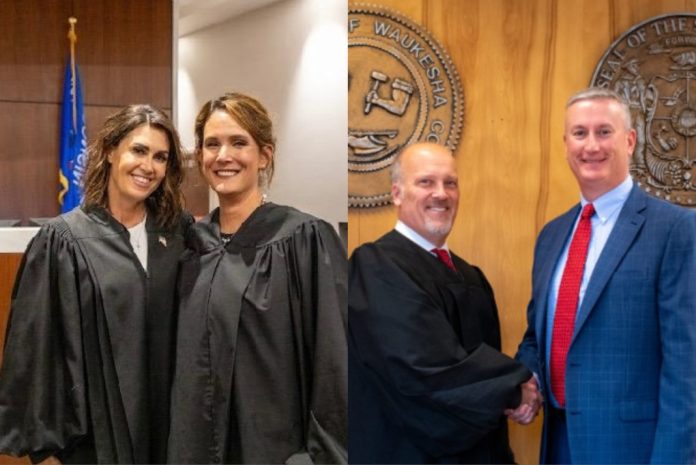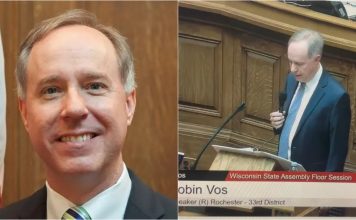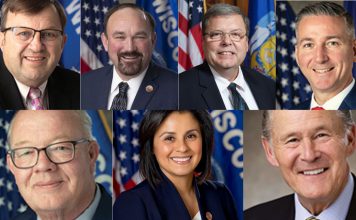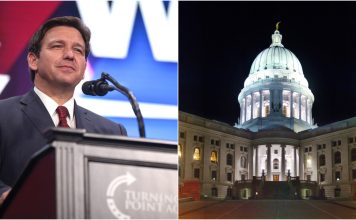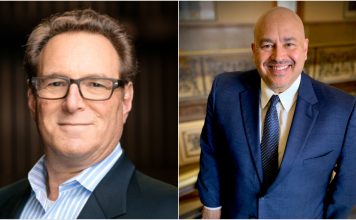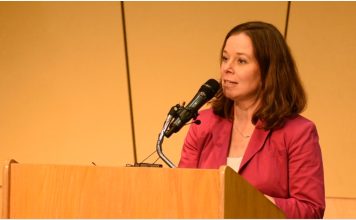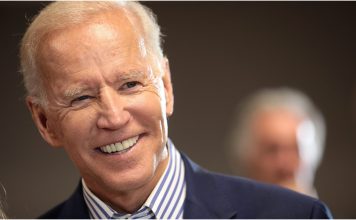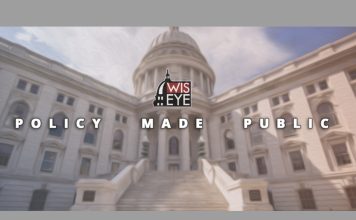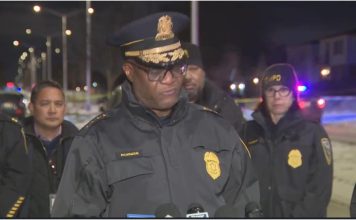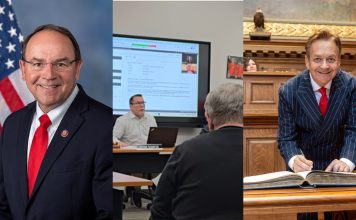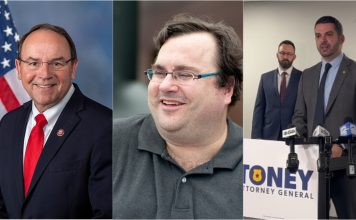Brad Schimel and top law enforcement groups endorsed David Maas for a Waukesha County judgeship. Tony Evers chose Bridget Schoenborn. Yet they’ve both got conservative support. What gives?
Being an appointee of Democratic Gov. Tony Evers is usually the political death knell in conservative Waukesha County. You don’t want that on your resume. Not out here.
So you might think Judge Bridget Schoenborn, whom Evers appointed to the Waukesha County bench last May, is headed for certain defeat this April. Not so fast. If you drive around the county, you’re apt to see her signs with the word “conservative” plastered on top. “I‘m running as the trusted conservative for Branch 4 to keep your family safe. Judge Jennifer Dorow knows it. WisRed knows it,” she insists in a recent Facebook ad.
A conservative Evers appointee? What?
Schoenborn says she voted for Donald Trump because he “brings back the spirit of America being a force to be reckoned with.” She is reading Tommy Thompson’s book and Catholic devotionals, and, in the only debate, sang the praises of… Antonin Scalia. She wants Brad Schimel to win, calling him “one of the hardest working judges in Waukesha County…God, we need him on the bench.”
We’ve heard two theories on all of this: Wouldn’t it be fantastic if Evers made a mistake and picked an actual conservative for the bench? But wouldn’t it be awful if Evers was onto something?
But there’s more to this story. Much more. For starters, Schoenborn speculates Evers picked her because she is a Native American woman. She’s listed as the Waukesha Co. Democrat Party’s preferred choice.
There’s another candidate in the race. David Maas works as a prosecutor for Fond du Lac County DA Eric Toney (a Republican who endorsed him), trains judges, once handled all state wiretaps, lives in Oconomowoc, and has the support of Supreme Court candidate Brad Schimel, who used to be his boss at the Wisconsin DOJ.
Maas thinks Evers picked Schoenborn because she played to his liberal sympathies, repeatedly praising uber-radical federal judge Lynn Adelman. Yes, Lynn Adelman.
“I have known David for over 20 years as a colleague. During that time, I have seen him exhibit a strong commitment to the Constitution and the rule of law,” Schimel says, tossing his endorsement to Maas.
Both Maas and Schoenborn were prosecutors for years. She spent 20 years as a federal prosecutor in Milwaukee, specializing in complex narcotics cases and asset forfeiture; he has worked as a prosecutor in Milwaukee, for the state DOJ, and now for Toney. She lives in Elm Grove, he in Oconomowoc.
Maas’s signs pitch him as law enforcement’s choice, and he’s got the backing of everyone from the Milwaukee Police Association to the Waukesha Chiefs of Police Association. With a contrast like that, you’d think he’d be the sure thing. After all, he wasn’t appointed by Tony Evers. And now is probably a great time for a candidate to showcase this picture showing Maas with Schimel, the Republican darling of the moment due to his state Supreme Court bid:
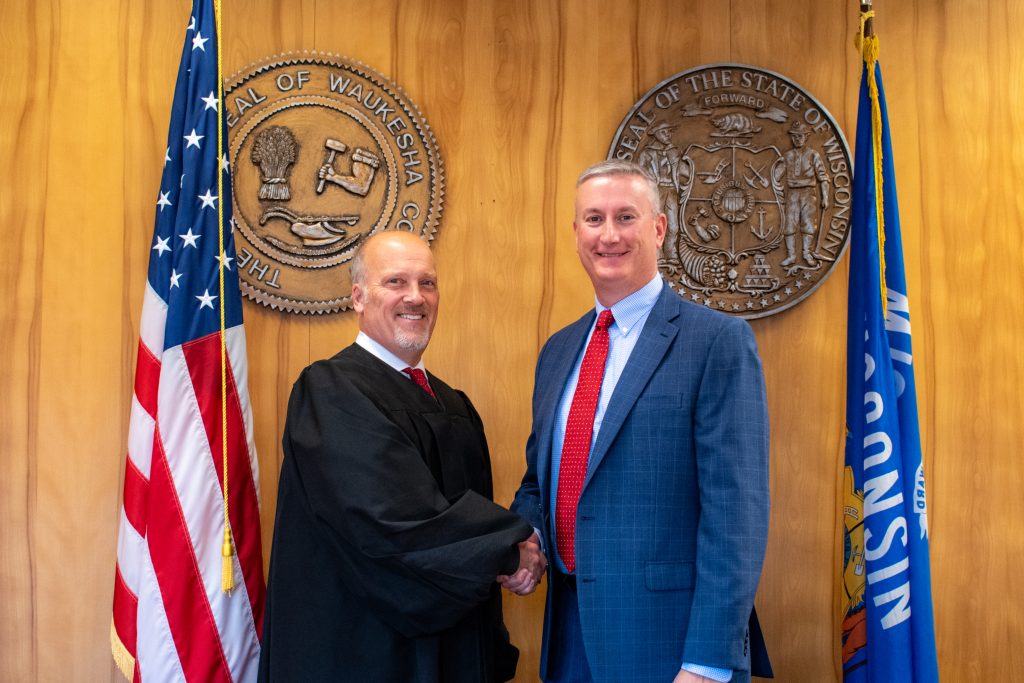
Except, if you talk to insiders, you hear the same refrain. They think that Schoenborn is positioned to win even if they aren’t personally voting for her (although time will tell on that); they think she’s working harder (he disputes this but acknowledges his prosecution work and family come first). WisRed – the county GOP’s voting initiative – has endorsed them both.
Why did Schoenborn apply for the Evers’ appointment? “It was an opportunity to serve. I didn’t care what political party was sponsoring it,” Schoenborn told us.
She acknowledged that being an Evers’ appointee in Waukesha County “can be a tough sell on the surface level, but underneath, I have to have faith that my qualifications speak for themselves.” She stressed her endorsements from “other strong conservatives,” such as Dorow, Judge Michael Bohren, and former Judge Randy Koschnick.
“I have to have faith that people will see me for what I am, which is a rule of law and tough on the ground kind of a judge,” she added.
Schoenborn points out that Maas tried for the Evers’ appointment, too; he just didn’t get it, although not getting chosen by Tony Evers is probably a badge of honor out here. Schimel, Toney, and then Waukesha County DA Sue Opper all penned letters to Evers touting Maas. Maas says he never even got an interview, but he seems kind of proud of that.
Schoenborn has an endorsement list too, including Waukesha’s police chief (who knew her as a federal prosecutor), the former sheriff, a couple judges and others, and, of course, the Queen of the Waukesha County Courthouse, Dorow, who is so close friends with Schoenborn that Schoenborn changed her profile picture to a photo of them together in their black robes (some of Maas’s supporters imply that Dorow’s endorsement derives from this friendship and a desire to have a second female on the Waukesha County bench).
Others tout Schoenborn, but their support also emanates from her lengthy career as a federal prosecutor handling complex narcotics cases. “In the 15 years I have known Judge Bridget Schoenborn, she has always been a dedicated and strong supporter of law enforcement. As a former prosecutor, I know she will continue to keep our community safe from violent criminals,” Waukesha Police Chief Daniel Thompson says in an endorsement.
All of that makes this one of the more interesting and head-scratching judicial races in Waukesha County in a long time, albeit one that has almost entirely flown beneath the radar. That’s another testament to Schoenborn’s campaign operation, though; talk radio hasn’t been talking about the Evers’ appointee who might just win it, creating a beachhead in conservative Waukesha County. And that’s something in and of itself.
Read Schoenborn’s application to Evers here: BS Application
Read Maas’s application to Evers here: PR2024-130 – Responsive Records_Redacted
Read Maas’s letters of reference to Evers, including from Schimel, here: Maas ltrs of rec-1
Schoenborn says she submitted no letters of reference to Evers, but we did find one from a federal prosecutor who touted her work on diversity.
But… Lynn Adelman?
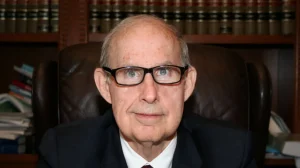
There’s another issue, though, and it’s a head-spinning one: Lynn Adelman. He’s arguably the worst federal judge in the entire country, a radical liberal flamethrower, and when Schoenborn applied to Evers for the judgeship, she listed LYNN ADELMAN as both a reference and a judge she admires. When we told her that this might be a bigger problem for her out here than Evers, she seemed puzzled.
“How so?” she asked.
You probably have to be over 40 to get how bad that is, and she’s lucky Mark Belling isn’t on the air right now because he surely would get that like no other. His head might actually explode. Adelman’s probably the most head-scratching choice a “conservative” judge could cite, and Maas argues it’s absolutely disqualifying. How one admires BOTH Adelman and Scalia is an equation that we haven’t cracked unless the latter is an attempt to ameliorate the impact of the former.
Let’s revisit Adelman for a minute; in case you don’t remember him, you need to understand how bad he is from a conservative perspective; he is the former Democratic state senator turned Bill Clinton appointee who found voter ID unconstitutional because of race (a decision that was overturned). He was publicly rebuked for an “intemperate” diatribe against Chief Justice John Roberts, President Donald Trump, and the Republican Party. He overturned the conviction of a white supremacist. He allowed the families of people shot by the acquitted Kyle Rittenhouse to sue him. He found an Evers’ action constitutional denying busing to a Catholic school. It goes on and on. And on.
We asked Schoenborn whether she supports voter ID, and she took us through a Rube Goldberg machine to get the answer.
“Kind of broken. Like, election fraud is all over the place right? Because we’ve got so many issues. We’ve got the processes behind the scenes,” she responded. “We’re under attack from the other side of the aisle in ways that we don’t even know. Would voter ID help to curb fraud? Yes, I’m sure. Just like prosecutions would.”
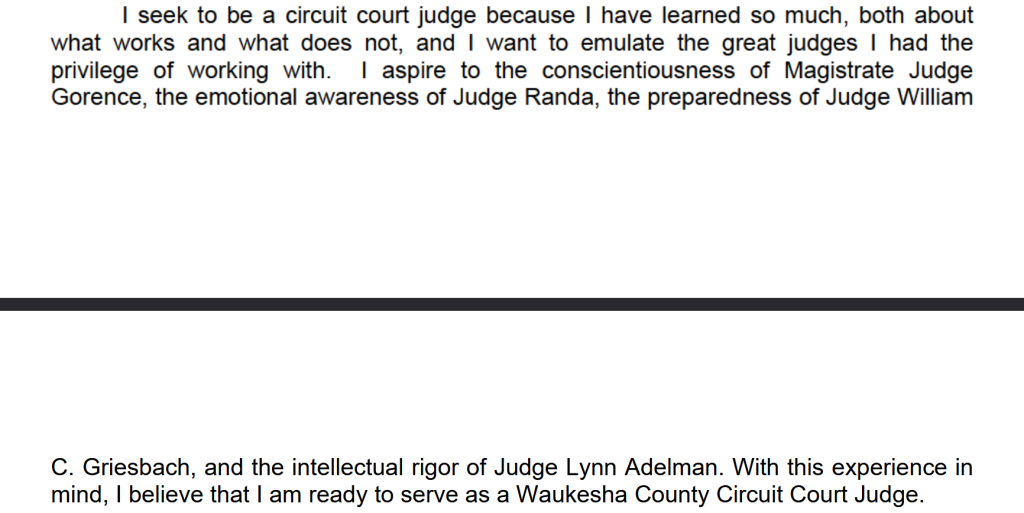
“I don’t know how any judge or any judicial candidate could admire a judge like that,” Maas says. “Because to me, the foundation of being a judge is to follow the law, to have respect for the law; to do what the law says. And, to me, a judge like Lynn Adelman is the exact opposite of that. And if that’s who you admire, who you hold in your mind as what a judge should be, then that to me means you’re not qualified to be a judge.”
Schoenborn said she cited Adelman as a judge because “he let me feel heard. I’m not going to defend him. I’m just saying he made me feel heard, right?” She recalled one time she was “very vocal” in his chambers. She told the bailiff, “I’m not going down without a fight.”
What did she say about Adelman, exactly?
“I seek to be a circuit court judge because I have learned so much both about what works and what does not, and I want to emulate the great judges I had the privilege of working with. I aspire to the conscientiousness of Magistrate Judge Gorence, the emotional awareness of Judge Randa, the preparedness of Judge William C. Griesbach, and the intellectual rigor of Judge Lynn Adelman,” Schoenborn wrote Evers.
Asked to “identify three judges you admire and explain why,” she listed Adelman, saying she worked with him as a pro se law clerk for three years.
She wrote Evers that they did not always agree on sentences but added, “Regardless of the outcome, I immensely respect Judge Adelman for his intellectual honesty. I always feel heard.” In our interview, she added conservative Justices Annette Ziegler and Rebecca Bradley to her admiration list.
 For his part, Maas cited retired Milwaukee Co. Judge John DiMotto, a former prosecutor who wrote legal outlines that many people use, and Derek Mosley, a municipal judge known for his youth mentorship. He also mentioned Fond du Lac Judge Douglas Edelstein, who is a former prosecutor elected to the bench. None of these is particularly controversial.
For his part, Maas cited retired Milwaukee Co. Judge John DiMotto, a former prosecutor who wrote legal outlines that many people use, and Derek Mosley, a municipal judge known for his youth mentorship. He also mentioned Fond du Lac Judge Douglas Edelstein, who is a former prosecutor elected to the bench. None of these is particularly controversial.
Maas has also railed against Schoenborn for sitting on two DEI committees: one for the U.S. Attorney’s office and another for the state bar. Well, she did sit on the state bar committee but no more; the organization abandoned it after the conservative Wisconsin Institute for Law and Liberty filed suit. WILL argued the program granting clerkships and other opportunities based on race was discriminatory.
“I don’t know her politics. What I do know is what she told our governor when she applied. And what she told our governor was again that she admires a liberal activist judge,” Maas said. “What she told our governor in order to get the job that she’s in now is that she was a leader on diversity programs in the U.S. DOJ under Joe Biden. We know she was on the diversity clerkship selection committee with the State Bar that was found to be unconstitutional and was sued by the Wisconsin Institute for Law and Liberty. So those actions, to me, aren’t the actions of a conservative. Her words say that she’s conservative. Her actions tell me otherwise.”
However, we found this line buried in a letter of recommendation for Maas: “Attorney Maas used his position of authority to affect programming by including unconscious bias training and sessions advancing LGBTQ+ interests.”
Schoenborn said she assumed that “given her background, my heritage,” she was chosen for the DEI committees. That’s because she is a member of the Choctaw Nation, and she pulls out the tribal enrollment card to prove it.
“I believe in looking at someone’s resume and being like, ‘Can you do this or can you not?’ That is the perspective that I would take into that selection committee. And there were people who were not allowed to participate because they couldn’t cut it, right? They were analyzed based on merit. And so better to have someone like me, who is tough on crime,” she added.
She was also on a DEI committee for the U.S. Attorney’s office but didn’t want to talk about it.
She said DEI has “no place” in criminal court and that there is “no place for woke ideology.” She wasn’t familiar with the WILL lawsuit.
Schoenborn said it “could be a problem” if the state bar “only assisted students who applied to the diversity selection committee” in finding internships or clerkships, based on their race, but she added, “I don’t know that though. That’s not something that I thought about when I said, ‘Sure, I’ll do this.’”
Schoenborn, in turn, has sniped at Maas’s time as a Milwaukee County assistant DA, accusing Maas in a debate of having “worked in John Chisholm’s office for 9 years.” Dorow made the same argument, labeling Schoenborn as the “conservative” in the race in a letter to the Waukesha Freeman and accusing Maas of having worked in the offices of John Chisholm and Josh Kaul.
It’s true that Maas was a prosecutor for the Milwaukee County DA’s office for nine years, but he left in 2008. Chisholm didn’t become DA until 2007. It’s more accurate to say he worked in E. Michael McCann’s office and then worked in Chisholm’s office for a hot minute (okay, a year) before going to work for Republican AG JB Van Hollen and then Republican Schimel in the state Department of Justice before working for Kaul. Maas says he got frustrated by liberal Milwaukee County judges who made his job as a prosecutor harder, and that’s one reason he left Chisholm’s office for a Republican-run agency. (We asked new Milwaukee County DA Kent Lovern for Maas’s non-prosecution rate in that office but were told it’s too old to look up.)
Schoenborn’s side has also accused Maas of getting a reference letter from Josh Kaul’s office; the letter was signed by Deputy AG Eric Wilson, whom Maas describes as a “career prosecutor” who knew his talents in digital evidence-oriented prosecutions of sexual predators. And Maas says that when he realized Toney wasn’t going to defeat Kaul, at least last time around, he left and went to work for Toney, also a Republican, because Kaul obliterated the public safety and criminal prosecution mission of DOJ.
Two Interviews, Lots of Candor
We sat down separately with both Schoenborn and Maas at Smoke on the Water, a great BBQ joint in Okauchee. Both were amiable and earnest, and each was disarmingly candid. Our goal was to really get to know each candidate and give them a chance to explain and persuade.
How disarmingly candid? Schoenborn admits outright that Evers probably picked her because she is a Native American woman.
“I don’t know him (Evers). So I met him on a Zoom. We were on a Zoom for a very short period of time, and he offered me the job, and I could guess that it could have been my heritage, right?” she says. “Maybe because I am Native American. Like, there’s not a lot of us. Could have been my gender? I mean those things come with you.” She said he did not ask “hard-hitting legal questions.”
Maas had his own moments of jarring candor.
Asked if he likes Trump, Maas hesitated. “I don’t think he’s a presidential personality. Is he effective at what he’s doing? Is he, you know, effective at getting his agenda done that the country has elected him to do? I think so. I think he’s effective.”
Asked what he liked about Trump’s agenda, he said the “end to DEI,” adding, “I’m not a huge fan of wokeness.” He said he was a “little concerned with” the choice of talk show host and former Secret Service agent Dan Bongino as deputy director of the FBI because Bongino has been “outwardly partisan” at a time when the agency is under fire for being partisan. He didn’t agree with pardoning January 6 defendants “who caused physical violence or incited violence against the Capitol Police Officers. As for everybody else, you know, I get presidential pardon powers, and I get it on a case-by-case basis.”
Asked if he supported Trump, Maas responded, “Yes, I did as much as I could as a judicial candidate. You know, I could not officially endorse a partisan candidate. But, you know, I supported the county party, and I supported the young Republicans, and I supported the groups that were supporting that.”
He declined to say who he voted for. “I will say that, unlike my opponent, I vote in all elections.”
He’s referring to voting records that show Schoenborn skipped a lot of April elections in the past. Sure enough, WisVote shows that Maas has a more extensive voting history.
In some ways, the two have a lot in common.
Both are UW-Madison law school grads. Both are the children of large, reshaped families. Both have lived in Waukesha County for years. Both love their kids. Both spent their careers as prosecutors, Schoenborn for the federal government and Maas for the state. They both come across as earnest people, very friendly. Their hearts both seem to be in prosecution work. Both paint themselves as fans of judicial restraint who follow the rule of law. Both are out knocking on doors. Both like Brad Schimel. Neither has a campaign donation history – yes, we checked. Good conservatives like them both.
Maas seems to have a more intricate understanding of the law and a more solidly formed political background. He talks for some time in great detail about the need to modernize laws on pen registers to assist law enforcement, for example, sounding like a legal scholar.
Schoenborn calls herself “politically naive” and said she hasn’t belonged to either political party. One gets the sense she was focused like a laser beam on narcotics prosecutions instead.
Maas says he has “zero” interest in appellate or state Supreme Court. “I don’t have a grand or political ambition,” Schoenborn concurs. “I just want to continue doing this.”
We asked Maas point-blank about perceptions that he isn’t campaigning as hard as Schoenborn because we have heard this repeatedly, even from some of his supporters. Some say he didn’t reach out, one says he didn’t return a call, and others just say they don’t see him.
“I understand that that’s the narrative that now is being pushed by the other side,” he said. “You know, I work like generously a 50-hour-a-week job, and I am a prosecutor, and I commute 10 hours a week for my job. I have two kids in high school and 8th grade, and they have a lot of functions. Family is a priority to me, and I am still a prosecutor first. I owe it to my office, and I owe it to the State of Wisconsin to do my job as best as I can.” One recent week, he had 17 trials set for one day, although most resolve short of that.
In fairness, we have run into Maas at several events, most recently a Save America rally to help Schimel and support Trump in Washington County. Both were at a recent Americans for Prosperity event in Oconomowoc.
Who Is David Maas?
David Maas’s childhood was unusual in one respect; his dad was married and had six kids, but then the dad’s first wife died. David Maas is the only child of his parents. He lost his half-brother to kidney issues when he was 11 and his oldest sister to cancer when he was a senior in high school. His dad was a “conservative guy” who was a salesman who sold World Book encyclopedias, Christmas trees, and swimming pools. His mom was a stay-at-home mom who went back to college and became a teacher.
He said he was inspired to go into law when his dad’s company was sued over a pool-related injury. “You know, it just struck me as wrong, and I saw the impact that it had on him,” he said of his father. He enjoyed performing in Comedy Sportz when he was in high school and professionally in college. He thought he would be good at the “oral advocacy” part of the law. He wanted to get into a courtroom, so he quickly navigated to criminal prosecution.
Maas touts his experience as a state prosecutor “for 25 years in Wisconsin. I’ve practiced all around the state. I’ve handled every type of case you can imagine, from routine misdemeanors to homicide cases… That experience is unmatched. I’ve worked very closely with law enforcement throughout my career.”
He said he was promoted by Schimel to be deputy director of the complex criminal litigation unit at the state Department of Justice. “Part of my responsibilities were to develop training conferences for prosecutors and law enforcement all around the state.” He trained them in strategies “for aggressive prosecution.”
“In my time at DOJ, I specialized in Internet crimes against children cases and digital evidence.”
“I’ve trained judges over the last five years too. So that type of leadership, that experience, I think is really needed on the bench.” He trained judges on digital evidence.
Maas said he helped write Alicia’s Law, which gave administrative subpoena power to the attorney general to follow up on cyber tips relating to child porn. When he left DOJ, he was doing 75 administrative subpoenas a week. Asked if there was a backlog, he said, “I don’t know, honestly. You know, part of the problem was, under Kaul, we were losing DCI agents. I wouldn’t be surprised if there was.”
He grew up in Franklin and went to Madison for law school. He lived in Wauwatosa when he worked in Milwaukee and then moved to Oconomowoc. His wife is an HR director and part-owner of a company that does retail marketing for mom-and-pop pharmacies. They have a son who is a freshman at Oconomowoc High School and a daughter who is an eighth grader.
Who Is Bridget Schoenborn?
Bridget Schoenborn is the youngest of seven kids. She has lived in Elm Grove since 2006 and raised her kids there; she picked Waukesha County because of the schools. Her boys are twins who are now in college. She married her law school boyfriend, John Domaszek, who is also an attorney and now lives in Houston, but they divorced in 2016, although they stayed “friendly.”
She was a federal law clerk (for Adelman), and her husband was doing insurance defense, mostly in state court. She focused “on being a mom and being a prosecutor. I love my town. I love my neighbors. I have a huge Catholic family. My mom is one of six; my dad is one of 10.”
Her dad was a teacher and then a high school principal in California. Her dad died in 2022.
Her biological dad, who was not the father who raised her, was a member of the Choctaw Nation. He died of a heart attack at age 31 when her mom was pregnant in the summer of 1977. Her maternal grandfather worked in the steel industry. She is one-fourth Native American.
She laughs that her name growing up was Bridget Jones – like the movie. She was raised in southern California and went to a Catholic girls’ school.
She received awards for investigation of the year from the Wisconsin Narcotics Officers Association and as a member of the Milwaukee County Animal Cruelty Task Force and was named a federal prosecutor of the year. She has served on the Elm Grove Police and Fire Commission.
She came here for law school. Participating in debates made her want to be a lawyer. “I’ve always had a strong sense of right and wrong. I get passionate. I get fired up about things.”
In law school, she started interacting with prosecutors. Schoenborn found working as a federal prosecutor in the eastern district of Wisconsin energizing. She worked under US Attorney Steve Biskupic, calling him “great, wonderful. A prosecutor’s prosecutor.” He was like an older brother to her and took her “under his wing. You could tell he really wanted us to be good prosecutors, and he’s one of my supporters to this day.”
She worked as a federal prosecutor from 2004 to 2024, when Evers appointed her to be a judge. She started in general crimes and then worked “with complex narcotics. You’re trying to dismantle or disrupt a drug trafficking organization, sometimes a street gang.” They indicted a 28-defendant case, and she was the lead on it. That’s how she got to know Chief Thompson of the Waukesha PD.
“So I fell in love with prosecuting violent street gangs and complex narcotics,” she said, noting that she found the cases challenging “but really rewarding.” Some of the cases involved homicides. They “tackled unique issues of law,” like “suppression litigation.”
They were able to “kick some serious ass,” and were “dealing with constitutional issues.” She prosecuted public corruption and financial crimes and was “asset forfeiture chief.”
Schoenborn said the transition to judge was not very hard because she “slid right into criminal court.” She asks, “Is there a safety issue here? What is this case? What is it about? What does it mean to hold this person accountable? That is what I do every single day right now.”
“I know I’m doing a good job, right? My colleagues want me to continue doing it. They know I’m pulling my weight. You know I have a good judicial temperament.”
Asked about her judicial philosophy, she said, “It’s apply the rule of law. It’s pretty simple, right? Start with the law; start with the text. Sometimes, that could be the Constitution; very often, it’s a statute.”
“I support law enforcement, follow the rule of law, and I acknowledge my limited role in the government.”
Table of Contents


